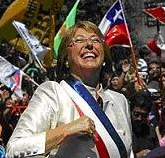

Michelle…
par Gustavo MARIN
Thèmes généraux liés :
Gouvernance .
Responsabilité politique .
We are not condemned to living under the guardianship of a patriarchal society.
Governance is legitimate when it expresses an ethic of dignity, tolerance, equality between men and women, and of respect for a shared memory.
A contribution to reflection on XXI Century governance based on the lessons drawn from the election of Michelle Bachelet to the Chilean Presidency.
Millions of Chilean men and women know that Michelle Bachelet is a mother of two children by two different fathers from whom she is separated (divorce was recently legalised in Chile) and that she is agnostic in a country where the majority officially declare themselves to be Catholic. This same majority knows that her father, Air Force General Alberto Bachelet, was put in charge by the government of Salvador Allende of helping with the distribution of basic foodstuffs in working-class areas in order to thwart the boycott and “black market” established by company owners and the truck drivers. Chilean men and women also know that General Alberto Bachelet died in 1974, a few months after the coup, as a result of the torture he was subjected to. Michelle and her mother were themselves imprisoned and tortured, and then had to go into exile.
32 years later, the majority of Chilean men and women elected her President of Chile. She is the first female President of what is considered to be one of the most male chauvinist countries in Latin America.
Her election confirms that a shared memory is essential to rebuilding the dignity of nations. Michelle Bachelet recalled this in her very first official speech on 11 March 2006.
Before he died on 11 September 1973, President Allende pronounced this prophetic phrase : Llegará el momento en que se abran las grandes alamedas por las que camine el hombre libre. “The moment will come when the broad poplar avenues will open and be walked by free men”. Just three decades later, Michelle Bachelet ended her first speech as the elected President by calling for the celebration of that historic day para que hombres y mujeres tengamos abiertas las grandes alamedas, “so that, men and women, we keep free the broad poplar avenues”.
Of course Chile’s economic and social situation will not change from one day to the next.
The country has been given as an example of the success of neo-liberal politics in Latin America with 6% growth in the last few years. However, Chileans are also conscious of the deep inequalities that continue to exist with 20% of the 15.8 million inhabitants hit by extreme poverty in this country, which represents the second largest gap between the rich and poor in Latin America.
Moreover, Michelle Bachelet was elected with 53.5% of the vote, which is more than clear, as is also the 46.5% of the losing candidate representing a political right that claims to be modern but which has allied itself electorally and politically with the other party of a right that is fiercely conservative and authoritarian, and which was the civil support for the Pinochet regime.
However, Michelle Bachelet’s victory is something more than an electoral and political victory. There were a few more men than women among her voters. Her government is made up of equal parts of women and men, and in this way she scrupulously respects equality. Today, in the various demonstrations that take place, women wear the presidential sash, turning this symbol into an item of clothing of the people. At its heart, this election constitutes first of all an ethical symbol and an anthropological fact. It demonstrates that the citizens of the XXI Century are not condemned to living under the guardianship of a patriarchal society.
April 2006


